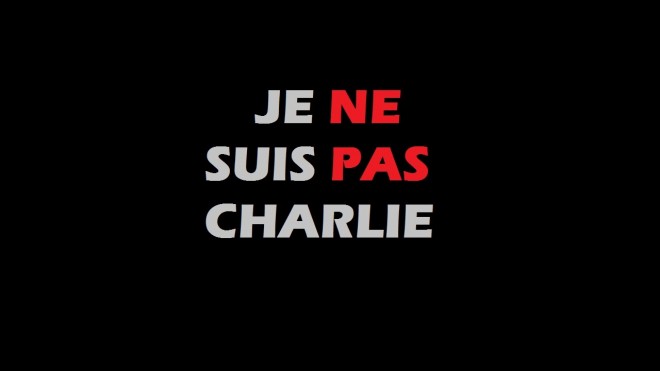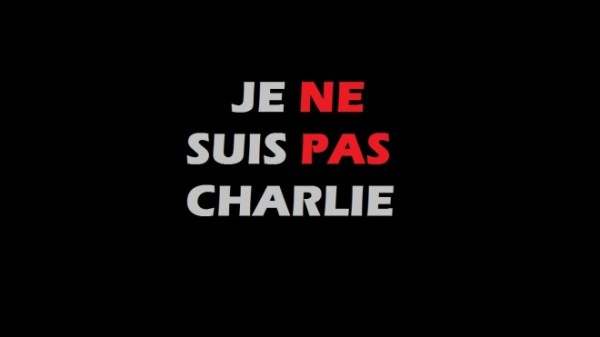
By: Sandip Roy
Source: Alternet
Je suis Charlie?
Well, not quite. I really am not Charlie Hebdo.
Nothing – no cartoon, no book, no song – justifies the kind of shooting rampage that happened in Paris. As Hassen Chalghoumi, the imam of Drancy mosque in Paris says, “These are criminals, barbarians. They have sold their souls to hell.”
And he is not talking about the cartoonists of Charlie Hebdo. He is talking about those who mowed them down and fled.
But the spontaneous outpouring of the #JeSuisCharlie hashtags also elides over the really thorny issue of free speech. While we want free speech to be absolute, in the real world, it is not. And even as we stand with Charlie Hebdo we cannot pretend not to understand that.
Today, as a tribute to Charlie Hebdo, outlets in India like Mint and NDTV have published a sort of collector’s edition of some of their cartoons. It’s a respectful gesture but it’s also somewhat misleading.
Assuming most readers in India are not regular consumers of Charlie Hebdo’s cartoons, it gives them a more sanitized, PG-rated impression of their fare. As Jacob Canfield writes in the Hooded Utilitarian, “its cartoons often represent a certain virulently racist brand of French xenophobia. While they generously claim to ‘attack everyone equally’, the cartoons they publish are intentionally ‘anti-Islam’ and frequently sexist and homophobic.”
And that’s putting it mildly.
In reality, some of Charlie Hebdo’s most offensive cartoons would not be published in most parts of the world. Few media outlets would print a cartoon of the Prophet Mohammad crouched on all fours with his genitals bared or show the Father, Son and Holy Ghost sodomizing each other. For that matter, most will balk at a cartoon like the one Onion put out showing a Lord Ganesha, Jesus, Moses, and Buddha all naked with erect phalluses having an orgy in the clouds? Now, that’s being equal opportunity offenders but that remains way outside the pale for most of the world. Anyway, in a freedom of expression absolute, it should not matter if you are an equal opportunity offender or a one-sided offender.
Let’s make no mistake – these cartoons are offensive to most people. And they are meant to be that way. They exist almost as a way to test freedom of expression to its limits rather than to make a satirical point. “This is the hardest part, the murder of the satirists in question does not prove that their satire was good,” writes Canfield. “Their satire was bad, and remains bad. Their satire was racist and remains racist.”
But that does not mean they deserved it. Not at all. The true mettle of freedom of expression is always tested against what we consider offensive or hateful or repugnant. That’s where the protection of freedom of expression actually means something. It’s easy to stand up for freedom of expression when we agree with the view point being depicted or do not care about it one way or the other. It gets far trickier when we are called upon to defend the right of someone to say what offends us deeply – whether it’s about our religion, our mothers, or our national leaders. The right to offend always butts up against the right to be offended.
In India, the latter routinely trumps the former. We prescribe to the thumb rule – when in doubt, ban. A publication putting out something like the cartoons Charlie Hebdo was infamous for would be picketed and shut down in double quick time. Our laws protecting “communal harmony” have far more teeth than our laws protecting freedom of expression. That’s why an NDTV or a Mint has to be careful about what images it selects from the Charlie Hebdo cartoons even as it wants to show solidarity.
As much as we might want to say “Charlie Hebdo tum aagey badho, hum tumharey saath hain” we cannot pretend that freedom of expression in India is the same as freedom of expression in France is the same as freedom of expression in the United States.
In an ideal world, the response to a cartoon that offends should be another cartoon. The response to a book that offends should be to not read it. The response to a film that offends could be a #BoycottPK social media campaign.
But the reality is there is no absolute right to free speech.
And yes, we forget that even France, which has become the embattled bastion of freedom of expression today, wears its own limits on its sleeve. Its staunch defense of freedom of expression did not prevent it from passing a ban on the niqab even though it was deliberately veiled as a ban on “clothing intended to conceal the face.” “Bans like these undermine the rights of women who choose to wear the veil and do little to protect anyone compelled to do so, just as laws in other countries forcing women to dress in a particular way undermine their rights,” says Izza Leghtas at Human Rights Watch. Between April 2011 and February 2014, French law enforcement fined 594 women for wearing the niqab.
A Reuters report points out that many of the cartoonists in Charlie Hebdo got their start in another satirical magazine called Hara Kiri which proclaimed its aim to be “inane and nasty.” That magazine was banned in 1970 after printing a mock death notice for General Charles de Gaulle. Its reincarnation after the ban was as Charlie Hebdo.
Everyone will read the lesson they want into the tragedy in Paris. Some will see it as proof that Muslim immigrants can never be truly French because they do not get what former President Nicholas Sarkozy called an “old French tradition, satire.” Some will see it as evidence of France’s xenophobic attitude towards immigrants coming home to roost. Salman Rushdie sees the attack as “the deadly mutation in the heart of Islam” and how “religious totalitarianism combined with modern weaponry becomes a real threat to our freedom.” Of course, that “threat” is not news in many parts of the world. People being killed in Iraq and Syria by Isis or in Afghanistan by the Taliban have known that for a long long time. It just hits us harder when it hits us in Paris. Or Sydney. Or London.
And very ordinary Muslim immigrants minding their own business will probably bear the brunt of the backlash as Arabs and Sikhs in the US did post-9/11 for as Charbonnier, the editor of Charlie Hebdo once told Le Monde while defending his right to offend that “when activists need a pretext to justify their violence they will find it.”
But that argument offers us no answers to the knotty question of freedom of expression, an idea to which we all think we subscribe. Those JeSuisCharlie profile pictures on Facebook, perfect little squares all of them, create an image of geometric uniformity as if we subscribe to that right in equal measure. But if anything this tragedy forces us to admit that when it comes to what constitutes freedom of expression, most of us are not even close to being on the same page.
I think of myself as a staunch supporter of freedom of expression but I realize the disquieting truth that I could never publish some of the cartoons Charlie Hebdo did. It would go against every fiber of my being. But I will defend their right to exist and condemn what happened to them with every fiber of my being as well. But I just cannot say #IAmCharlieHebdo.
The views expressed in this article are the author’s and do not necessarily reflect those of MuslimVillage.com.




